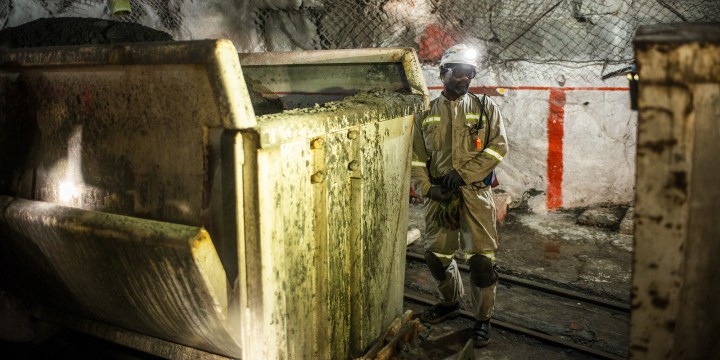MAVERICK CITIZEN OP-ED
Review of the SA Mineral Resources Administration System is a good starting point for reform

The scale of the problems in the minerals sector is immense. How does it move towards good governance policies and practices and begin to tackle corrupt conduct, rather than aiding self-serving political interests?
David Lewis is the Executive Director and Mashudu Masutha is a Legal Researcher focused on extractive resources at Corruption Watch.
If South Africa is ever to achieve its goal of a sustainable, transparent extractives sector which provides benefits to all stakeholders, it has no option but to implement the policies of the Extractive Industries Transparency Initiative. The sector is in dire need of a thorough overhaul, and the recently announced review of Samrad — the South African Mineral Resources Administration System — is a good place to start.
There is a global consensus about the need to fight corruption within the extractives sector. Not only are the decisions on who can extract resources, on what terms, and how revenues are distributed all inherently sensitive political matters, they are fertile ground for corruption. Relying exclusively on government action to effectively tackle corruption in a mineral-rich economy is particularly illusory in situations where natural resource rents and policies are the primary means for exercising and perpetuating political influence.
One of the many reasons international financial institutions and international standard-setting bodies in the extractive sector, such as the Extractive Industries Transparency Initiative (EITI), develop multi-stakeholder frameworks and agencies that enhance transparency and accountability, is primarily because illicit interests and political system dynamics underlying governance in the extractive industries thrive in opaque and unaccountable environments — to the detriment of economies and sustainable development of communities. National laws and local institutions simply cannot adequately provide the transparency and good governance required in the management of natural resources.
South Africa is no different. For more than a century, the country’s mining industry has been one of the main driving forces and is still a cornerstone of the economy, one of Africa’s wealthiest. This is attributable to a number of factors, including extraordinary mineral wealth, relatively good access to infrastructure and a well-developed financial sector.
In recent years, South Africa’s mining industry has come under pressure. The political instability and systematic corruption vulnerabilities have caused creeping regulatory uncertainty and a shortage of electricity. Reduced spending on infrastructure maintenance and development has reduced productivity, and land use and the massive looting of mining royalties have generated tensions with impoverished mining communities.
Samrad review a good starting point for reform
The scale of the problems within the sector is immense. The question is: how does the sector move towards good governance policies and practices and begin to tackle corrupt conduct, rather than aiding self-serving political interests? The review of the South African Mineral Resources Administration System is a good place to start. Minister Gwede Mantashe’s recent announcement that his ministry would conduct a review of Samrad — the online mineral right application system — will be welcomed by all but the most venal stakeholders.
The Samrad system was initially introduced to curb corruption by providing an online electronic system that creates a real-time database of the locality of applications, rights and permits granted or held in terms of the Mineral and Petroleum Resources Development Act (MPRDA), and where applications in terms thereof can be submitted electronically.
The system never lived up to its promise. According to Corruption Watch’s research study into the corruption risks in mineral application processes, Samrad is administratively ineffective and acutely vulnerable to corruption. Lack of transparency and non-functionality of the system led to double-granting of licences, inequality of access and knowledge of locality of applications and rights, among a host of other shortfalls.
The system also created a corrupt industry of public officials trading in obviously valuable information at the regional offices of the Department of Mineral Resources and Energy (DMRE). Samrad is and has historically amounted to an effective denial of the government’s frequently made declaration that the mining sector is “open for business” and that investment in the sector is to be welcomed. More so on the ground, where the failure of implementing proper management processes, and very clear administrative corruption at the critical first stage of the mining value chain, has led to tension between the stakeholders involved.
However, it can be argued that the commonality between all key stakeholders is the reality that natural resources are finite. The intervention of the Samrad review, therefore, must be approached from a perspective rooted in ensuring that resources are used beneficially and that all stakeholders must have a legitimate seat at the table. While the South African government has had differing attitudes towards EITI, this period of review within the context of the deterioration of corruption management by the DMRE, provides an opportune moment to relook at the implementation of the EITI standard and what it could mean for the country’s extractive sector.
EITI standard of transparency is essential for sustainability
The EITI framework is a standard of good governance that promotes a multi-stakeholder approach, inclusive of civil society, industry and government, to the management of natural resources. A key element of this standard is transparency — across the entire value chain of the mining life cycle, from the awarding of contracts and licences to production and revenue collection, revenue allocation, and socioeconomic spending. The EITI standard is widely noted as the global standard of transparency, with 55 resource-rich countries committing to an open and accountable extractive sector.
From a macro perspective, South Africa is a noticeable absentee from the EITI. Transparency must surely be a priority issue for the DMRE to achieve sustainability of the sector. The EITI standard on transparency will enable mine-affected communities to ascertain the socioeconomic spending of mineral rights holders and the government.
For the government, greater transparency will provide the wherewithal for sound evidence-based policymaking and investment promotion. For industry, to operate in an open, transparent and competitive sector. The gains for industry in joining EITI also include a reduction in tensions with the government and mining-affected communities. Given the success of the EITI in promoting transparency, anti-corruption measures and sustainable development, there is no credible argument for South Africa — still one of the world’s great mineral economies — to remain outside. It must commit to becoming an implementing country.
South Africa joining EITI is not a silver bullet to address the fundamental vulnerabilities in the licensing processes, or to rectify the online mineral application system or cadastral system. However, while there is a vital need to implement a globally competitive digital and transparent cadastre, the vested interest in delaying, sabotaging or otherwise preventing implementation of such a cadastre cannot be ignored.
Illicit interests will undoubtedly insert themselves into the review. The risk is that the irregularities in managing the backlog of more than 60% of transfer rights and more than 2,400 permitting applications will have a tangible and severe negative impact on mine-affected communities. For the minister to implement a transparent, easy-to-use, and corruption-proof mining cadastral system, standards of global best practice, and credible and trustworthy processes and institutions built on principles of accountability and transparency, will be required.
Government must implement EITI policies
The reality is that the South African government cannot afford to not implement EITI and solely rely on the adopted local and international disclosure frameworks. We don’t have to look further than the corruption scandals and conflicts of interest that have plagued senior public officials having interests in mining companies.
Additionally, lessons can be learnt from various sectors that the general standard for transparency, such as the Promotion of Access to Information Act framework, is not enough. Licensing rights and contract agreements in extractives embody particular elements and vulnerabilities which require specialised attention through the establishment of additional frameworks and the inclusion of particular stakeholders.
Accordingly, the insights drawn from neighbouring EITI-implementing countries illustrate that taking a one-dimensional approach to combating corruption in extractives is unlikely to achieve results. The success of the EITI standard derives from the multi-stakeholder approach to ensure effective oversight, purposeful transparency and embedding of practices that mitigate against value leakages and free riders, to guarantee optimal benefit of resources for all. The DMRE must therefore consider implementing EITI policies to progressively transform the sector, and the Samrad review provides a strong opening for the government to make the long overdue commitment.
The extractives sector is unusually susceptible to corruption. Therefore, the debate on whether South Africa should join the EITI should not revolve around ideological and diplomatic arguments, but should rather focus on practical ways in which to use the initiative as a first step towards securing transparency and accountability in the extractives sector. DM/MC
David Lewis is the Executive Director and Mashudu Masutha is a Legal Researcher focused on extractive resources at Corruption Watch.

















Comments - Please login in order to comment.